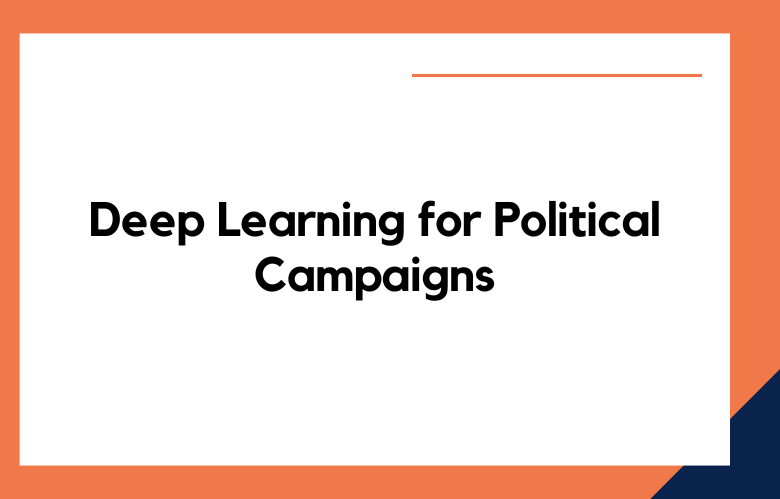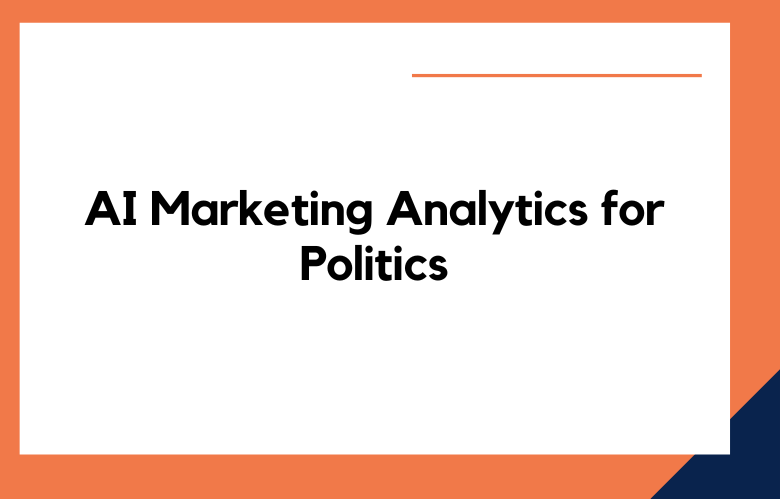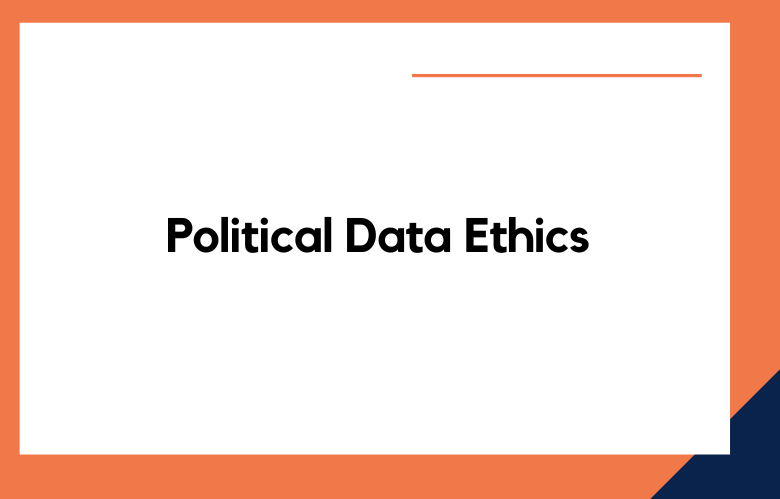Deep learning is a powerful form of artificial intelligence that involves training complex algorithms, known as neural networks, to recognize patterns in large datasets.
Deep learning can analyze large amounts of data in political campaigns, such as voter behavior, public opinion, and political trends, to help campaigns make more informed decisions and optimize their strategies.
Some potential applications of deep learning in political campaigns include:
Deep Learning For Political Campaigns
In the ever-evolving landscape of political campaigns, where every message, image, and interaction can make a crucial difference, the integration of deep learning technologies has emerged as a game-changer. Deep learning, a subset of artificial intelligence (AI) inspired by the structure and function of the human brain’s neural networks, offers a powerful toolset for understanding, engaging, and mobilizing voters like never before.
Political campaigns, traditionally reliant on polls, focus groups, and demographics, are increasingly turning to deep learning algorithms to analyze vast amounts of data from social media, news sources, and voter databases. These algorithms can uncover valuable insights into voter sentiment, predict electoral outcomes with greater accuracy, and even optimize campaign strategies in real-time.
In this era of digital communication and information overload, political campaigns face the daunting task of cutting through the noise to effectively reach and persuade voters. Deep learning empowers campaigns to navigate this challenge by identifying key issues, crafting tailored messages, and precisely targeting specific voter demographics.
However, the use of deep learning in political campaigns also raises important ethical and privacy concerns. As campaigns harness increasingly sophisticated algorithms to micro-target voters and influence opinions, questions arise about transparency, accountability, and the potential for manipulation.
Voter Insights
Deep learning can analyze voter behavior and preferences data, helping campaigns identify key voter segments and develop targeted messaging and outreach strategies.
Message Optimization
Deep learning algorithms can be trained to analyze voter responses to messages and themes, helping campaigns identify the most effective messaging strategies.
Sentiment Analysis
Deep learning can be used to analyze voter sentiment and attitudes toward different candidates and issues, providing valuable insights for campaigns.
Real-time Analytics
Deep learning can provide real-time insights into voter behavior and campaign performance, allowing campaigns to adjust their strategies and tactics as needed.
Predictive Analytics
Deep learning can be used to develop predictive models that forecast election outcomes and voter behavior based on historical data and current trends.
Risk Assessment
Deep learning can assess the risks and opportunities associated with different campaign strategies, helping campaigns make more informed decisions.
The Power of Deep Learning in Political Campaign Strategy
The following introduction provides a brief overview of the potential benefits and challenges of using deep learning in political campaign strategy:
Deep learning, a powerful form of artificial intelligence, is increasingly being explored as a tool for political campaign strategy. By analyzing large amounts of data, deep learning can help campaigns better understand voter behavior, preferences, and attitudes, enabling more targeted and effective outreach efforts.
However, using deep learning in political campaigns raises essential questions about data quality, bias, fairness, and technical expertise.
As deep learning in political campaigns evolves, it will be essential to consider the potential benefits and challenges carefully and ensure that deep learning is used responsibly and ethically.
Leveraging Deep Learning Algorithms for Voter Targeting
In the ever-evolving landscape of political campaigning, effectively targeting and engaging with voters is crucial for success. Traditional methods of voter targeting often rely on demographic data and historical voting behavior, but these approaches can be limited in their accuracy and effectiveness. Enter deep learning algorithms, a powerful tool that has revolutionized voter targeting in political campaigns.
Deep learning algorithms, a subset of artificial intelligence (AI), excel at analyzing vast amounts of data and identifying intricate patterns and relationships. In political campaigns, deep learning algorithms offer campaign teams the ability to leverage complex datasets to identify and target specific voter segments with unprecedented precision.
This guide explores the transformative potential of leveraging deep learning algorithms for voter targeting in political campaigns. By harnessing the power of deep learning, campaign teams can analyze diverse data sources, uncover hidden insights, and tailor their outreach efforts to effectively engage with voters on a more personalized level.
Join us as we delve into the world of deep-learning algorithms for voter targeting. From sentiment analysis to predictive modeling, deep learning offers campaign teams many opportunities to optimize strategies and drive greater engagement with the electorate.
Deep Dive into the Role of Neural Networks in Political Messaging
While Pi doesn’t provide information on the role of neural networks in political messaging, it’s clear that data-driven approaches are playing an increasingly important role in shaping political campaigns. Here’s an introduction to the topic:
Neural networks, a form of deep learning, are complex algorithms that can analyze large amounts of data to identify patterns and make predictions. As political campaigns increasingly leverage data-driven strategies, neural networks may have the potential to play a role in shaping political messaging.
For example, neural networks could analyze large amounts of data on voter behavior, public opinion, and political messaging to identify effective messaging strategies and target specific voter segments. Additionally, neural networks could be used to analyze real-time data on voter responses to political messaging, allowing campaigns to adjust their strategies in response to changing circumstances and voter preferences.
However, using neural networks in political messaging raises essential questions about data privacy, bias, and accountability. As this technology continues to evolve, the ethical and social implications must be considered carefully to ensure that neural networks are used responsibly and ethically.
Uncovering Insights: Deep Learning Applications in Political Polling
In political polling, the ability to accurately gauge public opinion is essential for informing campaign strategies and shaping political discourse. Deep learning applications have emerged as a groundbreaking tool, revolutionizing political polling and uncovering insights.
Deep learning algorithms, a subset of artificial intelligence (AI), excel at analyzing vast amounts of data and identifying intricate patterns and trends. In political polling, deep learning allows campaign teams to process diverse data sources, such as social media posts, news articles, and survey responses, to uncover nuanced insights into public sentiment and preferences.
This guide explores the transformative potential of deep learning applications in political polling. By harnessing the power of deep learning, campaign teams can gain a deeper understanding of voter opinions, identify emerging trends, and refine their messaging and outreach strategies accordingly.
Enhancing Political Advertising through Deep Learning Techniques
Certainly! Here are the steps for enhancing political advertising through deep learning techniques:
Data Collection
Gather diverse data sources relevant to political advertising, including demographic information, past advertising campaigns, voter sentiment data, and social media interactions.
Data Preprocessing
Clean and preprocess the collected data to ensure consistency and quality. This may involve data cleaning, normalization, and feature engineering to prepare the data for analysis.
Feature Extraction
To extract features from the collected data, utilize deep learning techniques such as convolutional neural networks (CNNs) or recurrent neural networks (RNNs). CNNs can extract visual features from images or videos, while RNNs can analyze text data from social media or news articles.
Sentiment Analysis
Apply sentiment analysis techniques to assess the sentiment of voter responses and social media interactions related to political topics. Deep learning models can analyze text data to classify sentiment as positive, negative, or neutral, providing insights into public opinion.
Audience Segmentation
Use deep learning techniques to segment the target audience based on demographic characteristics, interests, and behaviors. Deep learning models can analyze large datasets to identify distinct voter segments and tailor advertising messages to specific audience groups.
Content Optimization
Optimize advertising content using deep learning techniques to maximize engagement and impact. Deep learning models can analyze past advertising campaigns and voter responses to identify effective messaging strategies and creative elements.
Campaign Monitoring
Continuously monitor advertising campaigns using deep learning-based analytics tools. Analyze campaign performance metrics such as click-through rates, conversion rates, and audience engagement to assess the effectiveness of advertising strategies.
Adaptation and Optimization
Use insights from deep learning analysis to adapt and optimize real-time advertising campaigns. Adjust advertising content, targeting parameters, and delivery channels based on ongoing analysis and feedback to maximize campaign effectiveness.
Predictive Analytics: Revolutionizing Political Campaigns with Deep Learning
Predictive analytics and deep learning can provide valuable insights for political campaigns. The following is an introduction to the topic:
Predictive analytics, which uses data and statistical algorithms to forecast future outcomes and trends, is increasingly used in political campaigns. With the help of deep learning, a powerful form of artificial intelligence, predictive analytics can analyze large amounts of data and generate accurate predictions about voter behavior, election outcomes, and other essential factors.
Predictive analytics can help campaigns optimize strategies, target resources, and identify potential challenges and opportunities. For example, predictive analytics can identify key voter segments, forecast election outcomes, and assess the impact of different campaign strategies.
Conclusion
Integrating deep learning into political campaigns marks a significant evolution in campaign strategy and outreach. By harnessing the power of deep learning algorithms, campaign teams can analyze vast amounts of data, extract valuable insights, and optimize their messaging and targeting strategies with unprecedented precision.
Deep learning enables campaigns to understand voter sentiments, predict electoral outcomes, and identify critical issues that resonate with the electorate. Moreover, it empowers campaigns to engage with voters more personally, tailoring messages and outreach efforts to specific demographics and interests.
As political campaigns continue to evolve in the digital age, the role of deep learning will only become more prominent. By embracing this technology, campaigns can navigate the complexities of the modern political landscape with agility and effectiveness, ultimately driving greater engagement and securing electoral success.
Call: +91 9848321284
Email: [email protected]











